How to Cope in Unsettling Times

So what can we do in troubling times to deal with this malaise, to make it more possible to negotiate the growing fearfulness of everyday existence? While I have no crystal ball to gaze into for reassurance, some philosophical academics have proposed ways of coping that I find both helpful and reassuring. One is Professor Laurie Santos, of Yale University, who for several years has been teaching a course entitled The Science of Well Being. This course has been the most popular on the Yale campus in its 300-year history, with more than one-quarter of the student body enrolled. When she offered it online beginning in 2018, over 500,000 people enrolled—and in the past three weeks the course size has more than doubled, for it now has an online enrollment of 1.3 million students.
Another online course on the science of happiness has been taken by over half-a-million students. Emiliana Simon-Thomas, a neuroscientist who teaches this latter course, offers three tips for finding happiness, particularly in stressful situations.
1) Mindfulness – taking at least five minutes a day to slow down, to notice the sensations around you, to become grounded and centered on the present moment without being preoccupied, as we so often are, with thinking about the past or anticipating the future.
2) Connecting with others – spending time talking with others, either face-to-face (keeping the appropriate social distance), online, or by phone. It’s particularly important to talk about what’s going well. “You might ask someone, ‘What did you enjoy today?’”- or share a particular moment that you thought was moving or heartening.
3) Practice gratitude – Simon-Thomas recommends that we write down “what has gone well and who played a hand in that.” This might not be a spouse or neighbor but perhaps someone with whom we had a chance encounter or someone who delivered a package or with whom we had a kind word.
There’s no question that we face a set of unprecedented challenges in dealing with the coronavirus pandemic, but the above suggestions are vital for our psychological and spiritual health—and perhaps suggestions that we can continue to incorporate into our lives well after our enforced isolation is over.